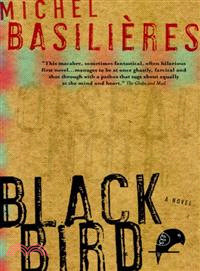Black Bird
商品資訊
ISBN13:9780676975284
出版社:Random House Inc
作者:Michel Basilieres
出版日:2004/03/09
裝訂/頁數:平裝/311頁
規格:20.3cm*13.3cm*2.5cm (高/寬/厚)
商品簡介
作者簡介
相關商品
商品簡介
In this wholly original novel alive with misfortune and magic, Michel Basilieres uncovers a Montreal not seen in any other English-Canadian work: a forgotten blue-collar neighbourhood in between the two solitudes. Gothic, outrageous, yet tender and wise, Black Bird is as liberating as the dreams of its wayward characters, and as gripping as the insurgencies that split its heart.
The Desouches have inhabited the same run-down house in working-class Montreal for years, much to the dismay of their landlord, and its ramshackle architecture perfectly mirrors that of the eccentric family living inside. Grandfather is a sour old grave-robber who relishes in the anguish he causes his wife and family. Uncle shares the same occupation, and otherwise spends much of his time drunk and alone. Neither is looking forward to the winter, which means lost work, due to the frozen ground. Father doesn’t share their gruesome job, but comes up with his own schemes anyway. Mother lies down to sleep away her grief when her father dies, and does not wake up for months. A plain French woman named Aline marries into the family, having been fooled by Grandfather’s smooth ways, only to find herself alienated in a household that chooses to speak English. Marie, the granddaughter and an FLQ terrorist, could share her language — she certainly resents that a part of her is English — but is too caught up in her politics and her anger to get involved. It falls to Marie’s twin brother, Jean-Baptiste, to play occasional translator, though as always he’d prefer to be upstairs in his attic room reading literature and writing awful poetry. Throw in a judgemental pet crow, a confused ghost, a mad doctor, peculiar neighbours, maverick policemen and the walking dead, and you’ve got the makings of the ultimate domestic drama, Montreal-style.
When an FLQ bomb set by Marie kills not only the expected strangers but her anglo maternal grandfather (what was he doing out for a smoked-meat sandwich at that hour, anyway?) it sets the family off on a notably bad run of luck. Then again, not many stretches would stand out as stellar for this peculiar group. Which points to one of the wonderful truths that Basilieres allows to guide his characters: that life is crummy and a struggle just as often as it’s not, but that doesn’t keep us from wanting to enjoy it in our own ways and hoping for a better tomorrow. As in life, there is a level of coincidence here that is too uncanny to not be believable. When the drunken premier runs down a man in the street, it is not only Marie’s boyfriend and fellow activist who is killed, but the crooked cops bring the fresh corpse to Grandfather’s door to be suitably dealt with. When some of Marie’s separatist pamphlets get mixed up with Jean-Baptiste’s poetry chapbooks, a prison term and a kidnapping are among the unexpected results. When Grandfather loses an eye, his vision improves. And as events spiral out of control, it seems that some of the Desouches are at their most content.
With Black Bird, Michel Basilieres has written a comic noir, a disturbing and hilarious study of how the October Crisis and the question of Canadian nationalism play out through the disjointed relationships within one family. And as with all of the best fiction, here the facts of our history do not get in the way of the truth, or of telling a good story. Compared to such disparate novels as One Hundred Years of Solitude, The Corrections, and Two Solitudes, Black Bird marks the fiction debut of a masterful and thoroughly entertaining storyteller.
The Desouches have inhabited the same run-down house in working-class Montreal for years, much to the dismay of their landlord, and its ramshackle architecture perfectly mirrors that of the eccentric family living inside. Grandfather is a sour old grave-robber who relishes in the anguish he causes his wife and family. Uncle shares the same occupation, and otherwise spends much of his time drunk and alone. Neither is looking forward to the winter, which means lost work, due to the frozen ground. Father doesn’t share their gruesome job, but comes up with his own schemes anyway. Mother lies down to sleep away her grief when her father dies, and does not wake up for months. A plain French woman named Aline marries into the family, having been fooled by Grandfather’s smooth ways, only to find herself alienated in a household that chooses to speak English. Marie, the granddaughter and an FLQ terrorist, could share her language — she certainly resents that a part of her is English — but is too caught up in her politics and her anger to get involved. It falls to Marie’s twin brother, Jean-Baptiste, to play occasional translator, though as always he’d prefer to be upstairs in his attic room reading literature and writing awful poetry. Throw in a judgemental pet crow, a confused ghost, a mad doctor, peculiar neighbours, maverick policemen and the walking dead, and you’ve got the makings of the ultimate domestic drama, Montreal-style.
When an FLQ bomb set by Marie kills not only the expected strangers but her anglo maternal grandfather (what was he doing out for a smoked-meat sandwich at that hour, anyway?) it sets the family off on a notably bad run of luck. Then again, not many stretches would stand out as stellar for this peculiar group. Which points to one of the wonderful truths that Basilieres allows to guide his characters: that life is crummy and a struggle just as often as it’s not, but that doesn’t keep us from wanting to enjoy it in our own ways and hoping for a better tomorrow. As in life, there is a level of coincidence here that is too uncanny to not be believable. When the drunken premier runs down a man in the street, it is not only Marie’s boyfriend and fellow activist who is killed, but the crooked cops bring the fresh corpse to Grandfather’s door to be suitably dealt with. When some of Marie’s separatist pamphlets get mixed up with Jean-Baptiste’s poetry chapbooks, a prison term and a kidnapping are among the unexpected results. When Grandfather loses an eye, his vision improves. And as events spiral out of control, it seems that some of the Desouches are at their most content.
With Black Bird, Michel Basilieres has written a comic noir, a disturbing and hilarious study of how the October Crisis and the question of Canadian nationalism play out through the disjointed relationships within one family. And as with all of the best fiction, here the facts of our history do not get in the way of the truth, or of telling a good story. Compared to such disparate novels as One Hundred Years of Solitude, The Corrections, and Two Solitudes, Black Bird marks the fiction debut of a masterful and thoroughly entertaining storyteller.
作者簡介
Michel Basilieres was ten years old and growing up in Montreal during the October Crisis. He still remembers the tensions vividly — though he was busy preparing for Halloween at the time. But the events and fears that effected everyone in Montreal have stayed with him, as those defining sorts of memories that take root in childhood. Not even the holiday festivities were exempt: in 1970, the Basilieres children were taken by their father to the anglophone community of Westmount to trick-or-treat, as opposed to their usual route downtown. As Michel has said in one interview, “We went trick-or-treating to houses, all of which were guarded by Canadian troops…. He showed us the people with wealth and power and influence were guarded at their very doors and very homes. That made a deep impression on me.” From then on, Michel knew that this was a story he wanted to tell, and you could say that in those early experiences was the genesis of Black Bird.
Michel Basilieres has commented often on the lack of attention English Canada pays (whether in literature or memory) to the October Crisis and the issues at its heart, events that are so central to Quebec consciousness and to our national identity. “What’s hardest for people today to understand is the fear many people felt, both French and English…. When the crisis finally erupted, it became the focus of world attention. And we were invaded by the army. We were under martial law, and we knew that anyone could be arrested and detained without charge on the least pretext. And that happened. 500 artists, writers, journalists, musicians, poets and professors were rounded up and incarcerated. People don’t seem to understand when I make this point about Canada, the country I grew up in: we sent the army to arrest the intellectuals. We had always been taught this kind of thing was the brutal act of repressive dictatorships.”
For Michel, language is not only a factor in the defining of Quebec, or of Canada, but has been so in his own life. Growing up in Montreal with a French father and an anglophone mother, he has always felt somewhat separate from the two cultures — as does his character, Jean-Baptiste. Michel’s language is English, which has always added to the distance: “My name, for example, has been a constant problem, to tell you the truth. In Montreal everyone expects me to be perfectly fluent in French and they’re surprised when I’m not. In Toronto, people think my name is Michael. Or, if they’re writing to me, they think I’m a woman.”
Much of the humour of Black Bird comes from Michel’s conscious effort to have fun while writing. “I was aware of how difficult it was to be a writer because I had met so much resistance along the way. I realized that, given that the chances of publication were so slim, I might end up with only a manuscript in the drawer…. I was really just trying to amuse myself.” Throughout the writing process, he’d tell his own jokes, and when they show up on the page they add a richness to his portrayal of Montreal — and some of its odder inhabitants. Michel’s experience as a bookseller gave him a realistic view of his chances of being published, even by a small publisher, but then his hopes were surpassed: Black Bird was discovered in the slush pile at Knopf Canada, and became part of the publisher’s celebrated New Face of Fiction program. And though the attention that has been focused on Michel since publication has dramatically affected his life, sometimes in unexpected ways, he still considers the whole experience to be “a dream come true.”
Today, Michel lives in Toronto and is writing his second novel. His other writing projects include a produced stage play, independent film work and a radio drama for the CBC, as well as arts journalism. He has worked as a bookseller in both Toronto and Montreal.
Michel Basilieres has commented often on the lack of attention English Canada pays (whether in literature or memory) to the October Crisis and the issues at its heart, events that are so central to Quebec consciousness and to our national identity. “What’s hardest for people today to understand is the fear many people felt, both French and English…. When the crisis finally erupted, it became the focus of world attention. And we were invaded by the army. We were under martial law, and we knew that anyone could be arrested and detained without charge on the least pretext. And that happened. 500 artists, writers, journalists, musicians, poets and professors were rounded up and incarcerated. People don’t seem to understand when I make this point about Canada, the country I grew up in: we sent the army to arrest the intellectuals. We had always been taught this kind of thing was the brutal act of repressive dictatorships.”
For Michel, language is not only a factor in the defining of Quebec, or of Canada, but has been so in his own life. Growing up in Montreal with a French father and an anglophone mother, he has always felt somewhat separate from the two cultures — as does his character, Jean-Baptiste. Michel’s language is English, which has always added to the distance: “My name, for example, has been a constant problem, to tell you the truth. In Montreal everyone expects me to be perfectly fluent in French and they’re surprised when I’m not. In Toronto, people think my name is Michael. Or, if they’re writing to me, they think I’m a woman.”
Much of the humour of Black Bird comes from Michel’s conscious effort to have fun while writing. “I was aware of how difficult it was to be a writer because I had met so much resistance along the way. I realized that, given that the chances of publication were so slim, I might end up with only a manuscript in the drawer…. I was really just trying to amuse myself.” Throughout the writing process, he’d tell his own jokes, and when they show up on the page they add a richness to his portrayal of Montreal — and some of its odder inhabitants. Michel’s experience as a bookseller gave him a realistic view of his chances of being published, even by a small publisher, but then his hopes were surpassed: Black Bird was discovered in the slush pile at Knopf Canada, and became part of the publisher’s celebrated New Face of Fiction program. And though the attention that has been focused on Michel since publication has dramatically affected his life, sometimes in unexpected ways, he still considers the whole experience to be “a dream come true.”
Today, Michel lives in Toronto and is writing his second novel. His other writing projects include a produced stage play, independent film work and a radio drama for the CBC, as well as arts journalism. He has worked as a bookseller in both Toronto and Montreal.
主題書展
更多
主題書展
更多書展今日66折
您曾經瀏覽過的商品
購物須知
外文書商品之書封,為出版社提供之樣本。實際出貨商品,以出版社所提供之現有版本為主。部份書籍,因出版社供應狀況特殊,匯率將依實際狀況做調整。
無庫存之商品,在您完成訂單程序之後,將以空運的方式為你下單調貨。為了縮短等待的時間,建議您將外文書與其他商品分開下單,以獲得最快的取貨速度,平均調貨時間為1~2個月。
為了保護您的權益,「三民網路書店」提供會員七日商品鑑賞期(收到商品為起始日)。
若要辦理退貨,請在商品鑑賞期內寄回,且商品必須是全新狀態與完整包裝(商品、附件、發票、隨貨贈品等)否則恕不接受退貨。
























